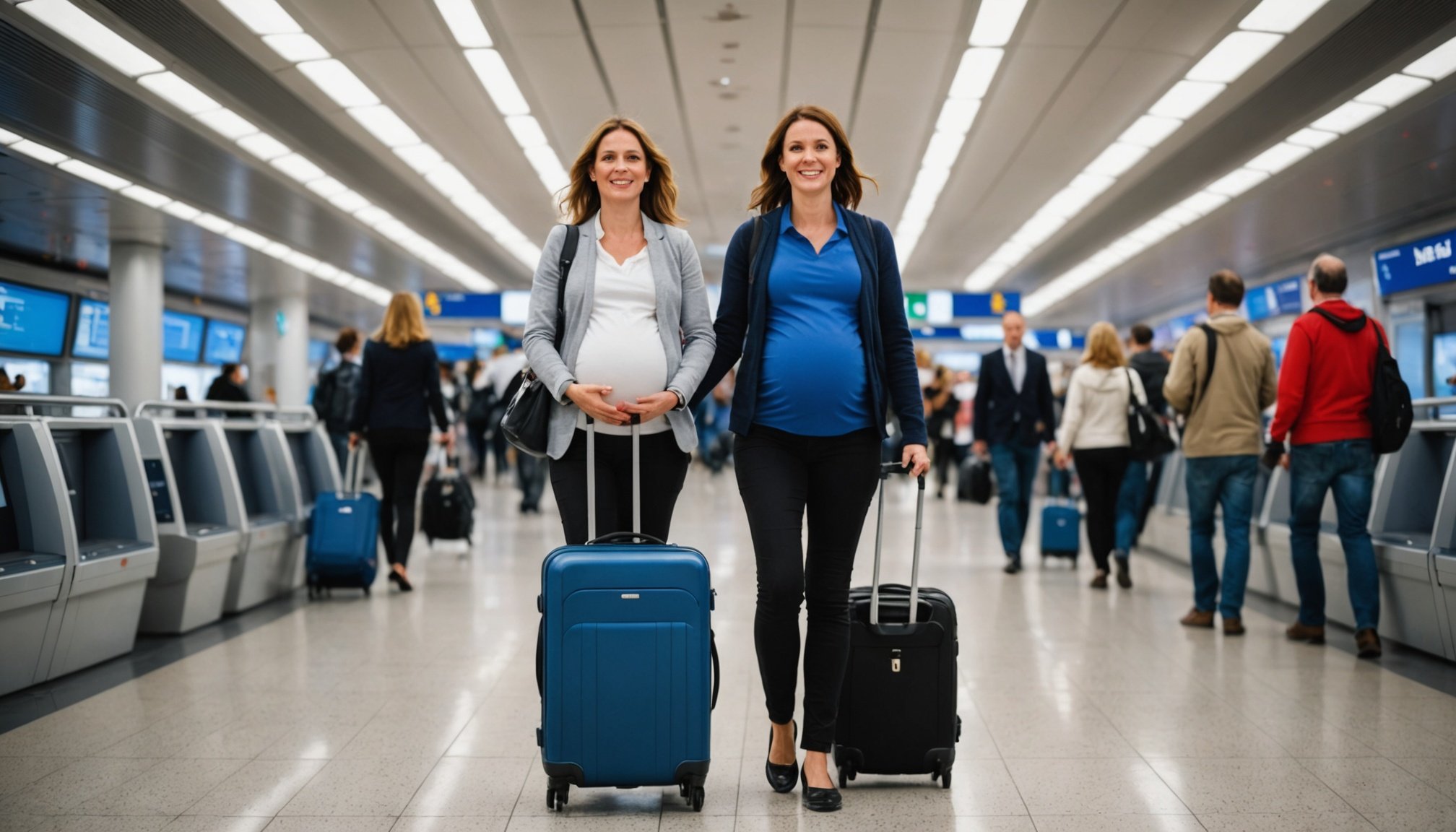Overview of Air Travel Regulations for Pregnant Travelers
Navigating air travel regulations while pregnant can be a concern for many expectant mothers. It’s crucial to understand these pregnant travel guidelines as they can vary significantly among UK airlines. Generally, most airlines allow pregnant women to fly until the 36th week for single pregnancies and the 32nd week for multiple pregnancies. However, specific airline policies can differ, so always verify with the airline prior to booking.
It’s vital to read the pregnant travel guidelines of the individual airline you plan to fly with. Policies might include the necessity of providing a medical certificate or clearance from a healthcare provider, particularly during the later stages of pregnancy. This can be important for both the health and safety of the mother and child.
In parallel : Essential Nutrient Guidelines for Vegan Pregnant Women in the UK: Key Considerations for Optimal Health
Several airlines may impose restrictions and recommendations to ensure a smooth travel experience. Air travel regulations often emphasize hydration, mobility during the flight, and the importance of wearing a seatbelt above the abdomen. Knowing these regulations helps avoid surprises and facilitates a safer, more comfortable journey.
Remember, each airline sets its own pregnant travel guidelines, so checking and understanding these before any planned travel is essential for compliance and peace of mind.
Have you seen this : Essential Dehydration Symptoms to Monitor During Pregnancy in the UK
Specific Airline Policies
Airline policies for pregnant travelers can vary, making it important to understand the regulations of your chosen carrier. Here’s a detailed look at three UK airlines regulations.
British Airways
British Airways requires expectant mothers to obtain a medical certificate if they wish to fly after the 28th week of pregnancy. This certificate should confirm that there are no complications with the pregnancy. The airline restricts travel after the 36th week for a single pregnancy and the 32nd week for multiple pregnancies. Ensure you have the necessary documentation needed for travel before boarding.
easyJet
Pregnant passengers flying with easyJet are allowed to travel up to the end of the 35th week for single pregnancies, and the 32nd week for multiple pregnancies. The airline does not require a medical certificate, but consulting with a healthcare provider is recommended. Be aware of their focus on health and safety recommendations for a comfortable journey.
Ryanair
Ryanair’s guidelines surrounding pregnancy travel state that pregnant women need a “Fit to Fly” letter from a doctor after the 28th week. The airline permits travel up to the end of the 36th week for single pregnancies. It’s essential to communicate with airline staff regarding any special assistance that may be necessary.
Required Documentation
Navigating travel while pregnant necessitates awareness of necessary travel documentation, especially concerning UK travel laws. Airlines often require specific paperwork to ensure the safety and legality of pregnant travelers. Critical documentation needed for travel includes medical certificates, a Fit to Fly letter, or other healthcare clearances, which are essential after reaching certain pregnancy stages, usually after the 28th week.
Medical certificates typically confirm that there are no complications with the pregnancy and that flying poses no risk to the mother or the baby. These documents should be completed by a recognized healthcare provider to be valid. Alongside medical papers, having proper identification and a boarding pass is essential for a smooth boarding process.
Pregnant travelers should consult with their healthcare providers to obtain the necessary clearances, particularly if their pregnancy involves special conditions that could affect travel plans. Checking with the airline for specific paperwork for pregnant travelers ensures compliance with airline policies and UK travel laws. Planning ahead and having all documents ready in advance minimizes stress and ensures a departing flight runs smoothly, which is crucial for both peace of mind and safety during air travel.
Health Considerations for Pregnant Travelers
Pregnancy travel safety requires careful attention to one’s health when navigating air travel. Before embarking on a journey, it is vital to ensure all recommended vaccinations and health checks are up to date. Consult with a healthcare provider to evaluate any potential exposure risks specific to your travel destination.
During flights, staying active and mobile is essential. Regularly stretching or walking to promote circulation and prevent clotting complications, such as deep vein thrombosis, can greatly benefit pregnant travelers. Incorporating simple leg exercises while seated is another effective strategy to enhance circulation.
Hydration is crucial. The cabin environment tends to be dry, increasing the risk of dehydration, which is why pregnant travelers should maintain steady fluid intake. This also aids in preventing discomfort like swelling and fatigue. Some airlines offer water throughout the flight, but bringing a personal bottle ensures access when needed.
Taking measures to avoid potential complications will contribute to a smoother travel experience. Recognizing the importance of air travel health helps expectant mothers enjoy the journey while safeguarding their well-being. If you encounter any health concerns during your flight, do not hesitate to contact the flight attendants for support, as they are equipped to assist in various situations.
Packing Tips for Pregnant Travelers
Traveling while pregnant requires thoughtful preparation to ensure comfort and ease. Packing wisely can significantly enhance your travel experience. Prioritizing essentials for pregnant women is key to staying comfortable and prepared for various scenarios that might arise during a flight.
Soft, breathable clothing is a must-have item. Opt for layered attire that allows for adjustments to cabin temperature variations. Comfortable footwear is also essential to accommodate swelling feet, which is common during air travel.
Packing snacks and maintaining hydration are crucial. Nutritious snacks like nuts, granola, or fruit provide sustained energy and help avoid hunger pangs. A refillable water bottle ensures you have constant access to fluids, preventing dehydration.
Consider carrying a small pillow or neck support for added comfort during the flight. Pack any required medication, including prenatal vitamins, keeping them within easy reach.
A travel-friendly first aid kit including items like motion sickness remedies and band-aids might come in handy. Remember, having a well-thought-out packing list tailored to your needs makes traveling much smoother. Knowing your needs and addressing them through mindful packing ensures a more relaxed and pleasant journey.
Preparing for Potential Complications
Pregnancy travel can be unpredictable, making preparedness vital. Pregnancy complications such as discomfort, nausea, or even preterm labor may arise during air travel. Understanding how to handle these scenarios can alleviate much of the associated anxiety. Anticipating travel risks involves proactive strategies like having a well-stocked first aid kit tailored to pregnancy needs.
Formulate an emergency plan with contingencies for various situations. This includes familiarizing yourself with the aircraft’s safety features and knowing where to locate emergency equipment. In case of unexpected complications, promptly inform the flight attendants as they are trained to manage such incidents efficiently.
Prepare a list of essential contact information, including your healthcare provider’s details and local medical services at your destination. Having easy access to this information reassures travelers should any issues arise. Understanding and mitigating these travel risks upholds peace of mind.
Being aware of the nearest hospitals or clinics at your destination is also wise. Planning for these possibilities and communicating your needs to the airline staff can ensure a safe and manageable travel experience. Such preparation allows expectant mothers to focus on enjoying their journey while prioritizing their health and safety.
Resources and Support Networks
Navigating air travel during pregnancy is simplified with the right travel support for pregnant women, which can be found in a variety of pregnancy resources. To remain informed on any changes to airline policies, online resources are invaluable. Websites dedicated to travel guidelines frequently update their content, ensuring travelers have access to the latest rules.
For added convenience, mobile apps and recommended travel guides tailored specifically for pregnant travelers can make planning easier. These tools often include checklists, tips, and reminders on health, documentation, and regulation compliance. They can streamline the process by providing essential information quickly.
Support networks, such as online forums and communities, allow pregnant travelers to exchange experiences and advice. These platforms provide a space to share insights on airlines, travel hacks, and navigating complications, fostering a supportive environment.
Consider connecting with these travel communities to not only benefit from others’ experiences but also to contribute your own, enriching the community knowledge base. Access to supportive networks and comprehensive resources empowers pregnant women to make informed decisions and enjoy a more comfortable and confident travel experience. This collective understanding ensures every journey is as smooth and enjoyable as possible.











